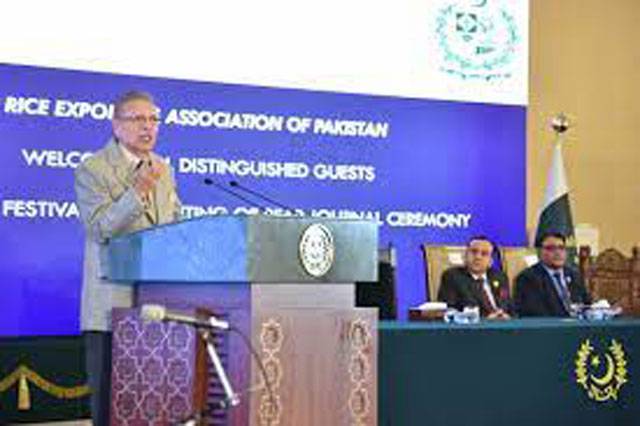ISLAMABAD-President Dr Arif Alvi has emphasised that attitudinal change in any sector of the economy could lead to its growth and development including the production and export of world famed Pakistani indigenous Basmati rice.
The president, elaborating his viewpoint, said that technological and scientific research and inputs would pave way for the latest innovations in the agriculture sector and the rice exporters should utilise all available tools to enhance their yield by supplementing the country’s exports. He was addressing the Biryani Festival and presenting of REAP journal organised by the Rice Exporters Association of Pakistan (REAP) at the Aiwan-e-Sadr.
The event was attended by the REAP office bearers, members of the diplomatic corps, exporters, traders and media persons. The president underlined the need for inclusion and encouragement of women in the agriculture sector as the country was looking towards such initiatives, leading towards further women empowerment. “With such changes in attitude, they can stimulate changes in the country’s economy,” he added. The president said that with proper scientific tools and knowledge, Pakistan could attain food autarky and cited Netherlands that was 19 percent smaller than Pakistan in size but had become the second largest food exporter in the world owing to usage of latest technology and research.
Appreciating the role of REAP in boosting country’s exports and the national economy, the president said that with organising of festivals and road shows in different countries, they were providing huge business opportunities to the local Basmati rice growers and exporters. He also suggested for exploring the organic cultivation of rice crop as the world including Pakistan were facing water scarcity. He opined that if the world resources were properly utilised, about 7 billion world’s population could be fed properly and regretted that along with the global trade, the exploitation of population and accumulation of wealth also continued.
He said that hoarding of food stuff was also a reason which led to food crises and it could be ended if priorities across the globe were set, adding that only $1 trillion could be suffice to address the food scarcity in the world. Contrary to it, the Islamic teachings had made the wealth a source for channeling the uplift of entire community, leading to well being of the human beings, he added.
Wednesday, December 04, 2024
President stresses upon attitudinal change as key to growth of any sector in economy

11:03 AM | December 03, 2024
PRCS marks Int’l Day of Persons with Disabilities
December 04, 2024
CM Bugti emphasises for ensuring transparency in development programme
December 04, 2024
Sukkur Barrage to remain closed from Jan 6-20
December 04, 2024
-
Three new polio cases reported in Pakistan, total rises to 59 in 2024
-
Three new polio cases reported in Pakistan, total rises to 59 in 2024
-
Nationwide internet disruptions cause major challenges for users
-
Gallup survey: 47pc of Pakistanis never used trains
-
Digital nomadism redefines work and travel across the globe
-
Lahore tops global pollution rankings as smog worsens, AQI reaches hazardous levels
Crisis in Korea
December 04, 2024
COAS’ Resolve
December 04, 2024
Crippling Social Media
December 04, 2024
Biden’s Last Gasp
December 03, 2024
Slashing Inflation
December 03, 2024
Major Environmental Problems in Balochistan
December 04, 2024
Contemporary Discipline Issues in Academics
December 04, 2024
Unprivileged Area
December 04, 2024
Beware of Product Warranties!
December 04, 2024
Law and Order
December 04, 2024
ePaper - Nawaiwaqt
Nawaiwaqt Group | Copyright © 2024





